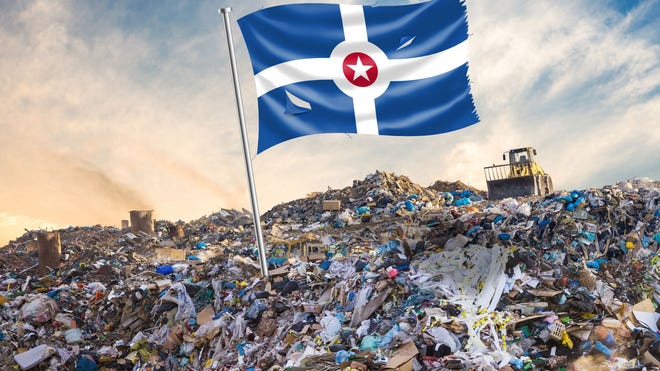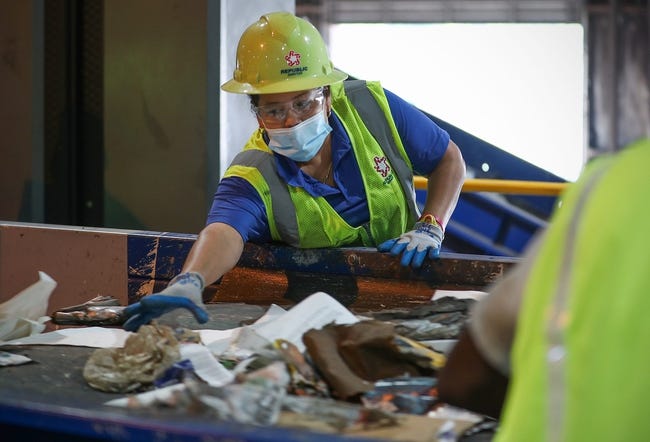Indianapolis has a dismal history with recycling. It did not become a priority until the 2000s when efforts were increased to provide more recycling options. In 2020, Indianapolis was ranked among the top 20 largest cities but also among the most wasteful. Its rate of 7 percent of its overall trash was recycled compared to a national average rate of 35 percent. A 2019 investigative report found that of the top 50 U.S. cities only Detroit and New Orleans recycled less.

Although financial limitations have prevented those cities from developing a better record for recycling, reporters revealed that the situation in Indianapolis was “a matter of policy.” Indianapolis was the nation’s largest municipality without a universal curbside recycling program. It was not until 2000 that a recycling program was established, allowing residents who desired recycling services to opt-in by paying a fee of about $100 annually. Unlike other cities that incentivized recycling by making it less expensive than waste removal, Indianapolis charged more for recycling, which had the effect of lowering participation. By 2020, only 10 percent of Indianapolis residents participated in the program.
The idea of reducing the amount of waste going into Indianapolis landfills came about as a result of the energy crisis in the 1970s. At this same time, Indianapolis was dealing with a need to reduce the amount of trash going into them. The city’s solution was to build an incinerator, which would reduce trash while also producing steam energy. Covanta (originally Ogden) a Morristown, New Jersey, company that provides energy-from-waste management services, was hired to build and run the incinerator, which was officially operational by 1988.
Over the next couple of decades, the incinerator proved problematic. It had multiple violations of air quality restrictions. It also played a role in disincentivizing the creation of a recycling program through stipulations in the contract between the City of Indianapolis and Covanta. The more trash that was sent to the incinerator, the greater the discount the city received on the energy it purchased from Covanta. The contract also required a certain amount of trash to be sent to the incinerator to avoid financial penalties. This stipulation was finally removed in 2016, but the city’s dependence on the incinerator remained.
By the early 2000s, non-governmental options for recycling other than the city’s opt-in program began popping up all over the city in an effort to meet the increasing public desire for access to recycling. The emergence of electronics with relatively short lifespans led to programs to manage old devices, televisions, printers, etc. In 2006, Recycle Force was founded to handle Indianapolis’ increasing e-waste while also providing employment and job training for previously incarcerated people. A year later, another e-waste recycling facility, Green Wave Computer Recycling, was founded in the city.

A glass recycling program began in 2008 in . The program was set up with area restaurants and bars in mind as the primary recyclers. By 2017, at least 234 tons of glass were recycled. The program was so successful that in 2017 the Indiana Recycling Coalition, along with Strategic Materials, applied for and received a grant from the state to promote recycling in four Marion County business districts. The program replicated the methods used in Broad Ripple’s program.
Other efforts increased awareness of and access to recycling for Indianapolis residents. Several area organizations began hosting recycle days, such as the Indianapolis Zoo’s Power Recycling Day. Other groups like , the city’s Office of Sustainability, and the Indiana Recycling Coalition put on programs to educate residents about recycling.
In 2014, the Closed Loop Fund, an industry group, offered interest-free financing for the city to develop a curbside recycling program. The city declined the offer, instead working out a $112 million deal with Covanta to combine its incinerator operations with a recycling program. In this program, Covanta would use machines that recognize and remove recyclable materials from trash and send them on to a recycling facility. This program never came to fruition due to a lawsuit that challenged the legality of the deal, ultimately canceling it.
In 2018, the city announced the Thrive Indianapolis Plan to have city-provided curbside recycling by 2025, the same year that the city’s contract with their trash and recycling provider, Republic Services, was up for renewal. The objective of the program was to overcome several issues that have plagued the city’s ability to develop a universal recycling program, including existing waste, long-term recycling and labor contracts, competition with other sustainability initiatives, and lack of funds for a collection infrastructure.

Help improve this entry
Contribute information, offer corrections, suggest images.
You can also recommend new entries related to this topic.

